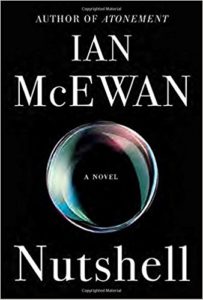 Can you imagine an entire novel, spoken through the senses of a foetus, awaiting his entry into this world?
Can you imagine an entire novel, spoken through the senses of a foetus, awaiting his entry into this world?
McEwan’s opening sentence sets the stage: “Here I am, upside down in a woman.” From that point, this young man extols first the “condition of the modern foetus. Just think: nothing to do but be and grow, where growing is hardly a conscious act. The joy of pure existence, the tedium of undifferentiated days. Extended bliss is boredom of the existential kind … In here I’m owed the privilege and luxury of solitude,” as his mother listens continuously, with ear-buds, to self-improvement books, biographies and world classics.
But at the same time it is a story of, first, murder, and then the revenge of his mother and of the young man himself. I realized that about halfway through this engrossing and often-hilarious tale, McEwan is embedded in a take-off on Hamlet. This youngster’s mother, Trudy, is drawn from Gertrude. His stepfather, Claude, is Claudius, a “fraud who’s wormed in between my family and my hopes.”
This leads the still-enclosed boy to conclude his “dim view of our species, of which psychopaths are a constant fraction, a human constant. ” His reaction: “Anxiously, I finger my cord.”
His brain, after listening to all that his mother hears, plus her plans with her lover, leads him to a sour conclusion about his life yet to come, “Long ago, someone pronounced a groundless certainty a virtue. Now, the politest people say it is. I’ve heard their Sunday-morning broadcasts from cathedral precincts. Europe’s most virtuous spectres, religion and, when it faltered, godless utopias bursting with scientific proofs, together they scorched the earth from the tenth to the twentieth centuries. Here they come again, risen in the East, pursuing the millennium, teaching toddlers to slit the throats of teddy bears. And here I am with my home-grown faith in the life beyond.”
Towards the end (or the beginning, his birth), he comments: “It’s already clear to me how much of life is forgotten even as it happens. Most of it. The unregarded present spooling away from us, the soft tumble of unremarkable thoughts, the long-neglected miracle of existence.” But the young man does start …
That sums up this mesmerizing story, in a nutshell: a woman’s womb for your world view.
My own coda: “To be or yet to be: that is gestation.”
Editor’s Note: ‘Nutshell’ by Ian McEwan, was published by Doubleday, New York, 2016.

About the Author: Felix Kloman is a sailor, rower, husband, father, grandfather, retired management consultant and, above all, a curious reader and writer. He’s explored how we as human beings and organizations respond to ever-present uncertainty in two books, ‘Mumpsimus Revisited’ (2005) and ‘The Fantods of Risk’ (2008). A 20-year resident of Lyme, he now writes book reviews, mostly of non-fiction that explores our minds, our behavior, our politics and our history. But he does throw in a novel here and there. For more than 50 years, he’s put together the 17 syllables that comprise haiku, the traditional Japanese poetry, and now serves as the self-appointed “poet laureate” of Ashlawn Farms Coffee, where he may be seen on Friday mornings. His wife, Ann, is also a writer, but of mystery novels, all of which begin in a bubbling village in midcoast Maine, strangely reminiscent of the town she and her husband visit every summer.